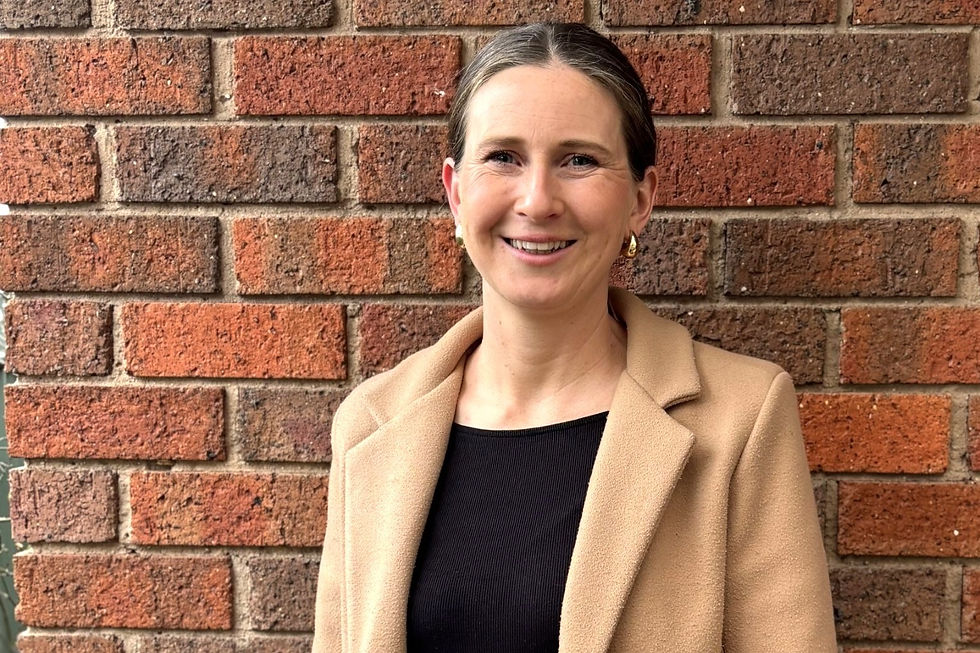CDE Rhiannan Pitts draws on lived experience to improve diabetes care and advocate for change
- tobyvue
- Aug 8, 2025
- 4 min read

For Credentialled Diabetes Educator (CDE) and rural nurse Rhiannan Pitts, supporting people living with diabetes is not just a profession, it is part of who she is.
Living with type 1 diabetes herself, Rhiannan draws on her lived experience, nursing background and strong sense of empathy to support her local community in regional Victoria.
Rhiannan works at Central Highlands Rural Health, which services Macedon Ranges Shire and Hepburn Shire in the Central Highlands of Victoria, north and north-west of Melbourne.
Less than two years ago, she started in her first diabetes educator role and became a CDE in June this year, balancing clinical work with family life and still finding time to advocate for better access to diabetes care.
"It's a role I’m incredibly proud of, especially while raising four beautiful children, managing our farm, and living with diabetes myself," she says.
From spinal nursing to diabetes care
She began her nursing career at Austin Hospital in Melbourne, where she progressed to Associate Nurse Unit Manager and Clinical Nurse Specialist on the acute spinal unit.
Her own diabetes diagnosis came during a tearoom celebration at work. Feeling unusually thirsty, she checked her blood glucose and saw "HIGH".
She had returned from a holiday in Europe two weeks earlier and was soon diagnosed with type 1 diabetes.
The news was difficult to process but witnessing the challenges her clients faced helped her maintain perspective, crediting their resilience for teaching her "lasting lessons in perspective and gratitude".
Determined to keep living fully, she focused on fitness and wellbeing, including endurance events, and raising funds for diabetes research.
In 2017, Rhiannan had her first experience of advocating as a consumer, speaking with political leader Catherine King through various news outlets about the importance of diabetes research.
Her advocacy contributed to securing federal funding for the Environmental Determinants of Islet Autoimmunity (ENDIA) study, which her two children have now participated in for more than seven years.
"I also volunteered at the JDRF Walk after having my first child, where I saw the value of peer support among families living with diabetes," Rhiannan says.
"Becoming a CDE felt like a natural progression, so I juggled my postgraduate degree in diabetes education through COVID lockdowns while working remotely from home.
"My goal was never just to provide clinical care, but also empathy, time, and support without judgement."
Building trust through lived experience and local care
Rhiannan's personal experience has made her acutely aware of how stigma and misinformation can affect people living with diabetes.
"I’ve been skipped in a group because 'you can’t eat cake,' handed articles about 'curing' diabetes, and told to inject insulin in the bathroom," she says.
"It can be humiliating."
She uses this insight to create a safe space for clients and approach them "with empathy, humour, and zero shame".
"I want clients to feel supported, not scolded,” she says.
"I want them to know I truly get it."
"If someone admits to a 2 am chocolate bar, I give them a high-five, not a lecture.
"Without trust, education doesn’t land."
Working in a local setting has brought a sense of connection and flexibility that Rhiannan values.
"There’s something special about supporting people in the place you call home and introducing technology that changes lives," she says.
Her approach to care is based on empathy and realism, teaching best practice but not expecting perfection.
She credits her CDE colleagues Beth and Steph for their mentorship and friendship, saying she’ll always be grateful for their support.
Advocacy grounded in justice
Rhiannan continues to use her voice to advocate for others, particularly older Australians to maintain access to CGM under aged care programs and reforms.
"I've written countless emails, spoken to the media, and raised concerns at every level I can," she says.
"CGM has been a game-changer for me.
"As someone living with diabetes, I know how life-changing this technology is.
"It should be accessible to everyone who needs it and it's heartbreaking to watch others go without."
She believes CDEs play an essential role in advocacy.
"Even when it feels like no one is listening, you keep going because people living with diabetes need strong voices in their corner," she says.
"As educators, we don’t just inform, we amplify; we help turn lived experience into meaningful change."
Resilience, movement and looking ahead
Rhiannan credits mindset as the strongest factor in living with diabetes.
"Don’t let diabetes take over your life and when it does, show yourself kindness," she says.
"Don’t let others' ignorance define your journey. Mistakes happen, and that's okay."
She also says sport and fitness help her, as she plays netball, participates in parkrun, and helps her local Auskick program.
When asked what she is most proud of, she says being invited to share her story is an achievement.
"I’m especially proud of securing my CDE role in my rural town navigating the new credentialling pathway, and having my voice heard in the media and to larger organisations and ministers about CGM funding barriers," she says.
"It's been a whirlwind start, but I love my job and the impact I’m making."
Looking ahead, she hopes to see subsidised access to CGM and insulin pumps for all who need them, fewer financial and bureaucratic barriers to care, and a shift away from shame and blame in how diabetes is spoken about.
"We need to embed 'language matters' into policy and education," she says.
"Finally, we need broader recognition of diabetes distress and burnout; it’s real and we need to talk about it."
Have a story to share? ADEA welcomes member contributions about the work you’re doing to make a difference in diabetes care. Please feel free to reach out to us at communications@adea.com.au.



